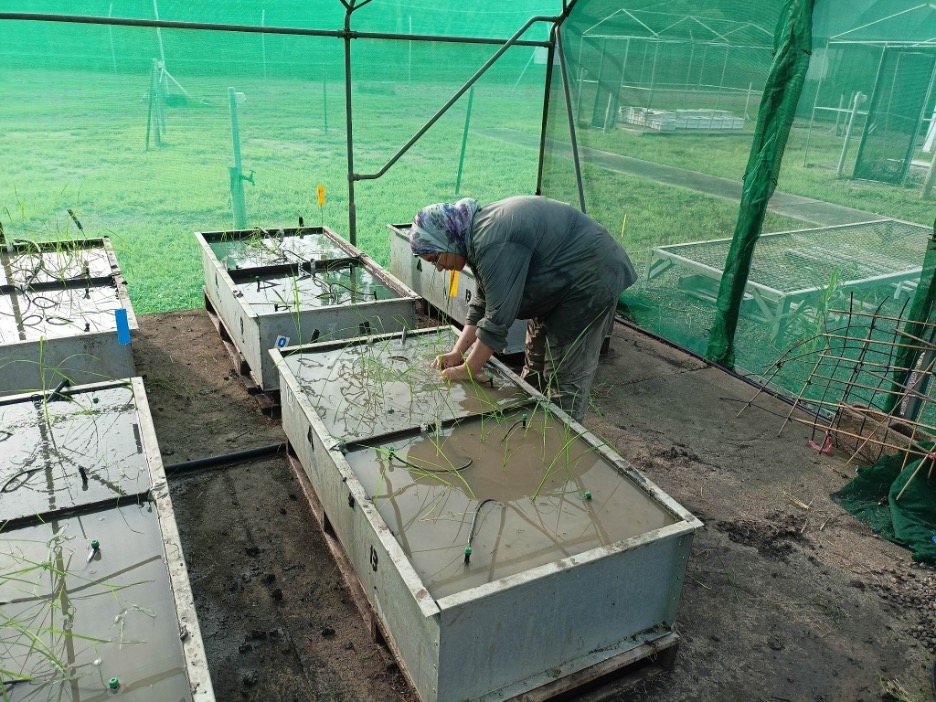Since early 2020, Gehan Abdelghany has been engaged on the Future Food Systems-backed ‘Agronomic investigations of Australian native rice species to support Indigenous enterprise development’ (‘Commercialising native rice’) project.
The four-year project is a collaboration between CDU’s Research Institute for Environment and Livelihoods (RIEL), Indigenous-led enterprise Pudakul, the Northern Territory Government Department of Industry, Tourism and Trade (DITT) and Queensland University of Technology (QUT).
Thanks to COVID-19-related restrictions on international travel, Ms Abdelghany began her time as an FFS PhD on the other side of the world, engaging with her project team via Zoom for nine months and completing much of her lit review at home in Tatha, Egypt. After gaining permission to travel to Australia, she arrived in Darwin in late December 2021.
By the time she left Egypt, Ms Abdelghany had already written two review papers – destined to become two chapters of her PhD thesis. More than two years in, she is making great progress.
It is anticipated that she will submit her PhD thesis for examination in late March 2024.
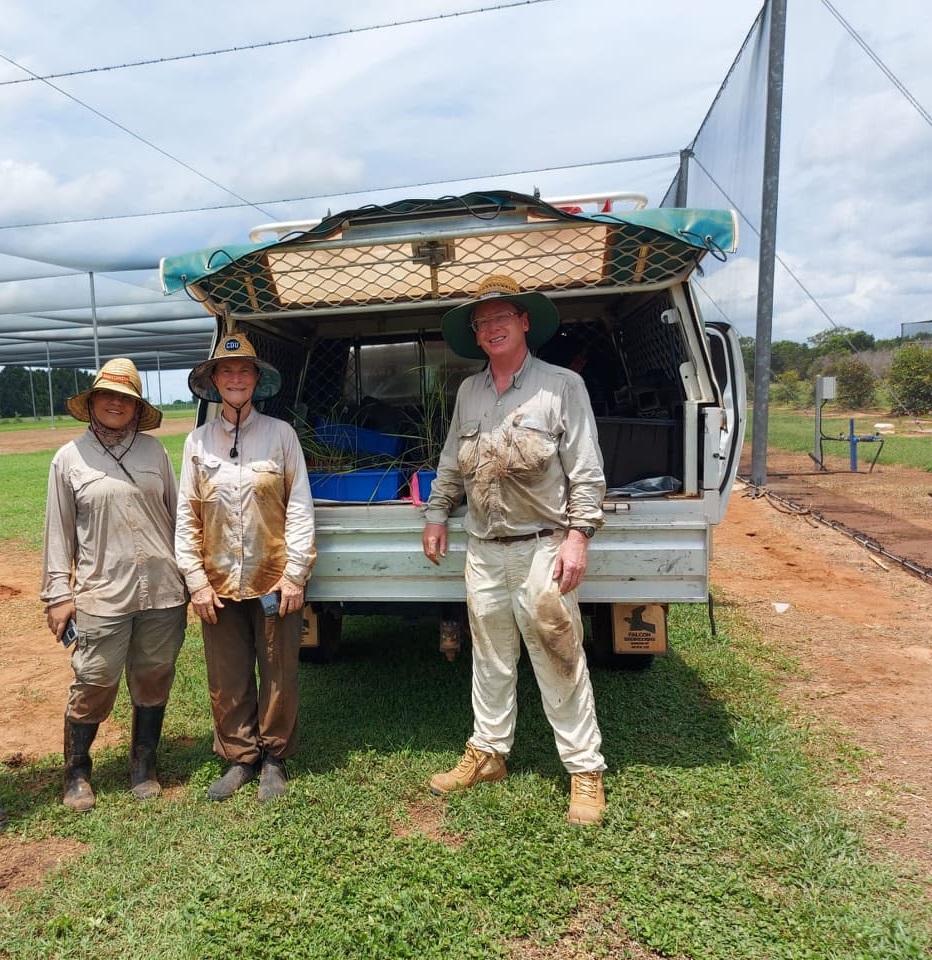
Left to right: Gehan Abdelghany (CDU PhD student), Penny Wurm (CDU) and Sean Bellairs (CDU) conducting a field trial at Coastal plain Research Station, NT on 7 March 2022. Credit: Sonam Adhikari Rana
A well-rounded skill set
From the very beginning, Mrs Abdelghany made a positive impact: “My assessors were highly impressed by the written proposal and the quality of my presentation,” she recalls.
Midway through her doctoral study, her supervisory panel – CDU Senior lecturer and project lead Dr. Sean Bellairs, and his colleague Dr. Penny Wurm and Dr. Linh Hoang from Queensland University of Technology – were confident about Mrs Abdelghany’s performance and commitment, stating “Gehan is a hard-working, indefatigable, and very capable PhD researcher”.
Her first thesis-related publication, a review paper, was published by Q1 journal Agronomy in December 2021. By mid-2023, another chapter of Mrs Abdelghany’s doctoral thesis, a meta-analysis of field trials, was submitted to a Q1 journal and is currently under review.
“Gehan is also a very effective and polished oral communicator – clear, confident, and dynamic”, co-supervisor and project team member Dr. Penny Wurm says. “This was apparent from her Confirmation of Candidature presentation, and conference presentation (online and in person) made, and commented on by reviewers as impactfully and impressively delivered.”
PhD research trials on Australian native rice
Trial 1: The effect of varying density levels and N rates on the yield, yield components, and grain quality of Australian native rice species
Part of Ms Abdelghany’s doctoral research involves an agronomic trial looking into the influence of varying density levels and nitrogen rates on the yield performance and grain quality of Australian native rice, she says. She conducted a two-season greenhouse experiment, first during dry season (May to September 2022), then repeated in the wet season (January to April 2023) at Charles Darwin University research shade houses facility, Darwin, Australia.
Initial findings of the 2022 dry season trial reveal that adjusting the hill density could be an efficient method for reducing the amount of nitrogen fertiliser needed in growing native Oryza, without sacrificing rice productivity,” Ms Abdelghany explains.
“However, during the wet season trial, there was natural lodging at the grain-filling stage in some growing areas within experimental tanks/plots as a result of storms and high-intensity rainfall. That suggests that cultivating these species under dry-season conditions may be optimal”.
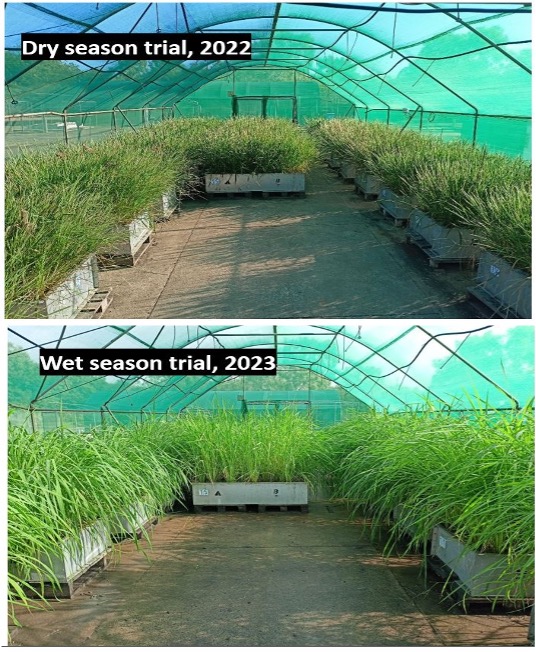
Gehan Abdelghany’s PhD research trial to cultivate two Australian native rice under four density levels and two N rates at CDU research shade-house facility (Source: Gehan Abdelghany).
Trial 2: Optimising seedling number per hill and fertiliser regime: A way forward to harness the productivity potential and grain quality of Australian native rice
As part of her PhD research, Mrs Abdelghany conducted a second agronomic trial – a pot experiment within Charles Darwin University research shade house facility, Darwin, Australia during the wet season (December to May 2023).
“This trial was to investigate the characteristics of population productivity under different N supplies and seedling densities per hill, and to explore the optimum combination of nitrogen level and seedling number per hill,” she explains. “Ultimately, to simultaneously improve rice grain yield, quality and nitrogen use efficiency.”
The results of this trial are covering three main agronomic aspects:
- grain yield and yield components (plant height, tiller number per hill, panicle number per hill, spikelet number per panicle, grain filling percentage, 1000 grain weight, above-ground biomass);
- N efficiencies, including agronomic efficiency and N use efficiency; and
- grain quality attributes such as protein content and amylose content.
“The results of the current research will help to adjust the appropriate gradients for nitrogen rate and seedling number per hill, [indicating] optimised management practices for enhanced Australian native rice production in North Australia,” Ms Abdelghany says.
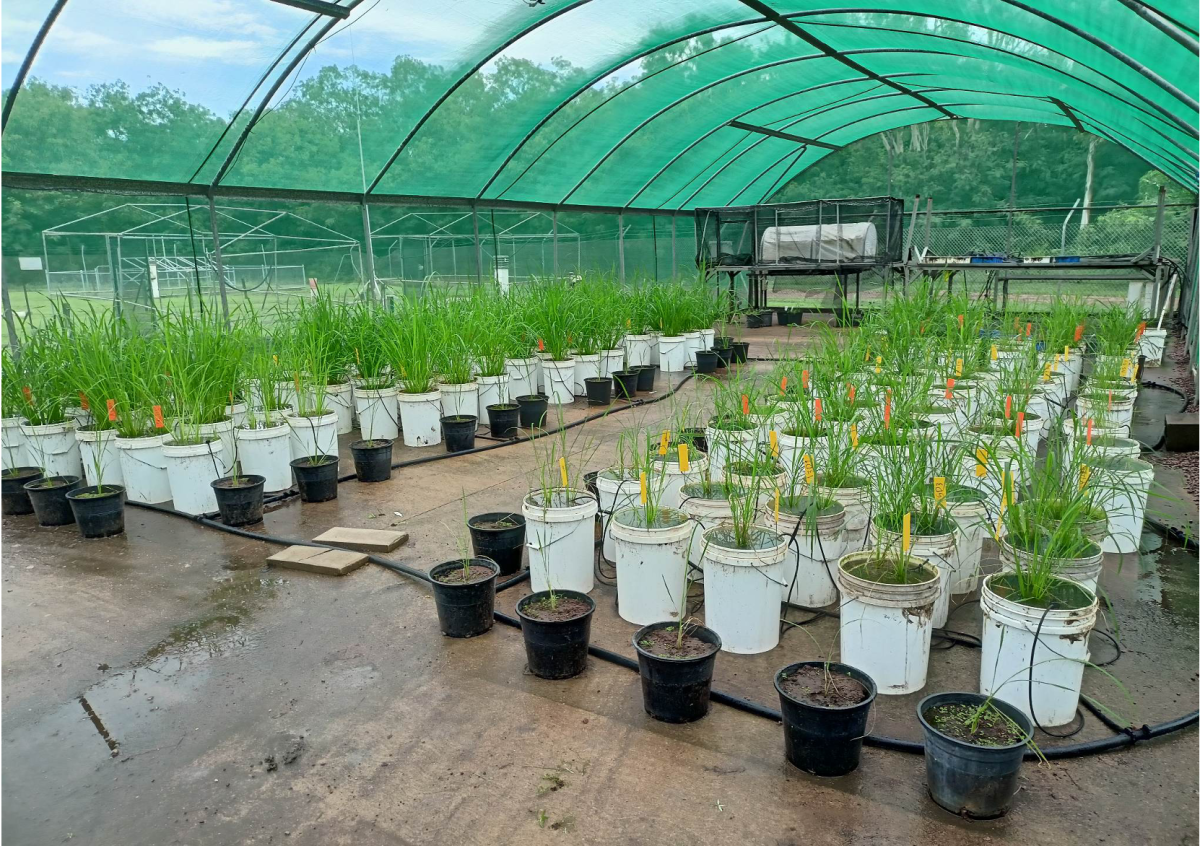
Gehan Abdelghany’s PhD trial to investigate the optimum fertilizer regime and number of seedlings per hill for two Australian native rice species at CDU research shade house facility during wet season (December-May 2023).
Shattering and Panicle bagging of Australian native rice
As a part of two PhD trials of Mrs. Gehan Abdelghany highlighted above, hundreds of panicles were bagged. Unlike Oryza sativa (common commercial rice varieties), the wild populations of rice species shattered easily (i.e. panicles drop their seeds to the ground), and required careful handling. Therefore, panicles of two Australian native rice (O. meridionalis and O. rufipogon) were bagged. Panicle bagging is necessary to prevent seed loss due to shattering, and to prevent mixtures of treatments at harvesting. Panicle bagging was conducted at the late vegetative stage (i.e.70 days after transplanting), the sampled tillers were tied loosely to a bamboo stake (5 cm x 2 m) to prevent plants from encroaching from one treatment to another to facilitate panicle bagging. Bagging was conducted using nylon net bags. These bags provide ample ventilation to facilitate anther dehiscence and prevent mold formation on glumes. The net bags were pinned to the bamboo pole. The bagged panicles were then harvested when the seeds shattered.
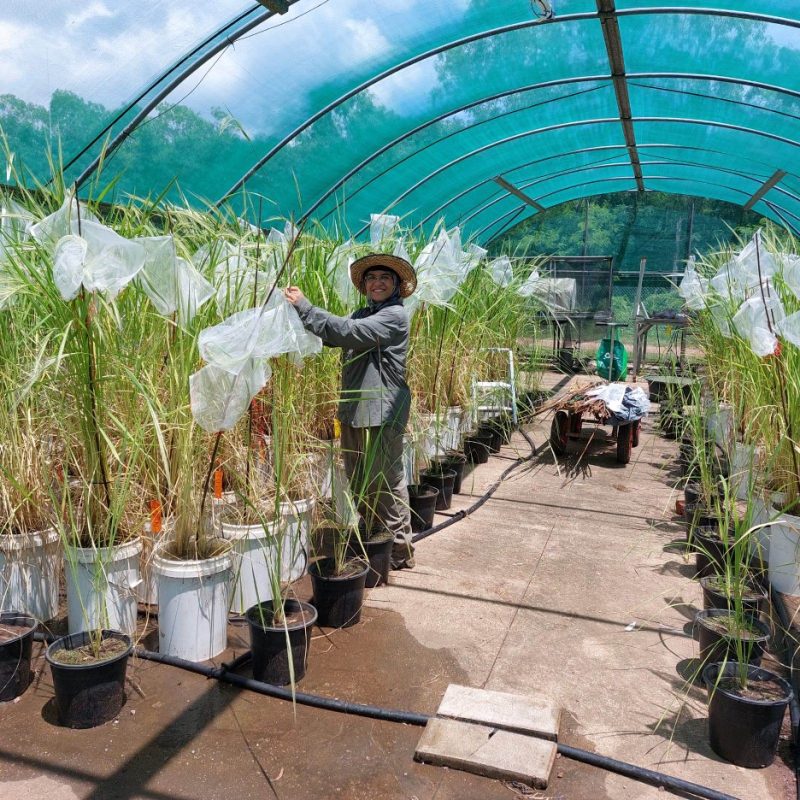
Panicle bagging of two Australian native rice (O. meridionalis and O. rufipogon) to prevent mixtures of treatments at harvesting. Panicle bagging was a part of two PhD trials of Mrs. Gehan Abdelghany at Charles Darwin University research shade house facility (Source: Charles Darwin University).
Presenting the PhD research work
Since arriving in Darwin, Mrs Abdelghany has embraced opportunities to showcase her ‘Native Rice Agronomy’ PhD project.
She has presented her research at supervisory meetings, at research conferences, and student showcases convened by Future Food Systems. She was also a finalist in the CDU 3-minute thesis competition in 2022, and is a regular contributor to the Commercialisation of Native Rice Newsletter, published twice a year.
Mrs Abdelghany has given interviews on ABC radio and television. She also coordinates with the CDU Research Media Officer to create project-related research promotion materials.
“Gehan understands the importance of research communication for impact, and has taken every opportunity to present and promote her work,” says Dr Bellairs (Principal supervisor).
2023 CDU Higher Degree by Research Conference (Darwin, Australia)
Gehan Abdelghany attended the CDU Higher Degree by Research conference, running on three consecutive days from 21-23 June 2023 in Darwin, Australia. She presented a 15-minute talk and did a good job of presenting a chapter of her PhD research work, entitled ‘Yield responses of native Oryza species to plant density and nitrogen rate in Northern Australia’.
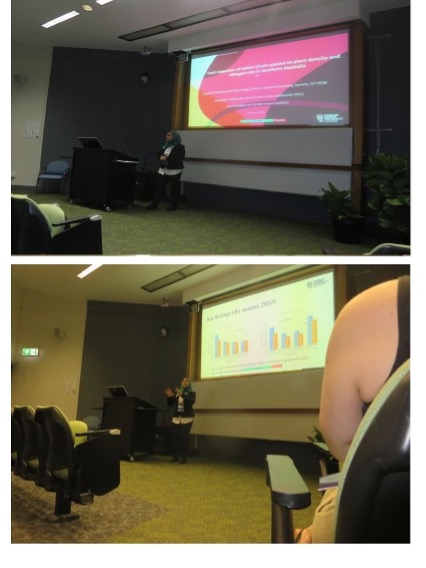
Gehan Abdelghany, presenting a chapter of her PhD research work on Australian native rice agronomy (Source: Charles Darwin University).
2022 Future Food System Summit (Brisbane, Australia)
Gehan Abdelghany gave an online Presentation of her PhD study with a title of “Agronomic Investigation of Australian Native Rice to Support Indigenous Enterprise Development” at “Future of Food Summit Conference”, 1-2 Dec 2022, Queensland University of Technology, Brisbane, Australia. A smart new Future of Food: Working together for a more profitable, planet-friendly agrifood sector – Future Food Systems.
You can listen to the online presentation via this link https://vimeo.com/769311711
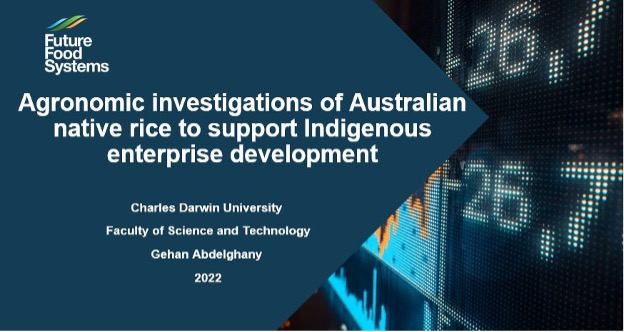
Gehan’s certificate of online presentation of her PhD research work, at “Future of Food Summit Conference”, 1-2 Dec 2022, Queensland University of Technology, Brisbane, Australia. Credit: Charles Darwin University (CDU)
2022 TropAg International Conference (Brisbane, Australia)
Mrs Abdelghany also attended the TropAg 2022 Conference in Brisbane, Australia (31 October- 2 November 2022), where she presented a poster outlining a chapter of her PhD, entitled ‘Effects of dense cultivation on the yield performance of Oryza sativa (L.): A meta-analysis of field trials’, co-authored with her supervisory panel along with two meta-analysis experts from China.
TropAg is a biennial international conference organised by QAAFI, part of the University of Queensland (UQ), with a focus on tropical and subtropical agriculture. “The breadth of topics, and the quality of presentations provided a heady mix of stimulation and food for thought”, Ms Abdelghany says.

Gehan Abdelghany (left; PhD researcher) and Dr. Penny Wurm (right; PhD co-supervisor) at TropAg Conference, Brisbane, Australia (1st November 2022). Gehan’s poster is the one with the blue heading. (Source: Penny Wurm).
2022 Darwin ABC TV interview
Gehan Abdelghany was interviewed by ABC Darwin broadcaster (Mitchell Abram) On August 2022 for showcasing her research trial on cultivating Australian native Oryza species.
You can listen to this interview via this link: https://www.dailymotion.com/video/x8e4rwu
3-Minute Thesis competition
The Three Minute Thesis competition celebrates the exciting research conducted by Doctor of Philosophy students. Developed by University of Queensland, Australia, 3MT is designed to cultivate students’ academic, presentation and research communication skills, supporting their capacity to effectively explain their research in three minutes in a language appropriate to a non-specialist audience. Mrs Abdelghany did a good job in presenting her PhD research work, entitled ‘Agronomic investigation of Australian native rice to support Indigenous enterprise development’, in three minutes, She was a finalist in this competition.
You can listen to her PhD video via this link.

Gehan’s certificate of presentation at 3 mins PhD thesis competition, Charles Darwin University, Darwin, Australia. Credit: Charles Darwin University (CDU)
Community engagement: Daminmin Art and Cultural Festival
Project partner Pudakul Aboriginal Cultural Tours held its inaugural Daminmin Cultural Festival on Wulna-Limulngan Country, Lambells Lagoon in the Northern Territory, Australia on 30 June and 1 July 2023.
“The festival is named after the creator turtle, who created the landscape on the Adelaide River floodplains where native rice grains are wild harvested for the native rice project,” Ms Abdelghany says. “This was a chance for the Native rice commercialisation project team to update interested visitors on developments, and to support Pudakul, the project’s long-term enterprise partner, in this new venture. Thanks to Lynette Kenyon (Darwin Business Manager) and Graham Kenyon (Darwin Business Owner and Traditional Owner) for being such warm and generous hosts.
“Some visitors stopped by the stall for a chat to ask about native rice. The most common question asked was, What does it taste like? We were pleased to report that Australian native rice has an attractive nutty flavor and aroma, and changes from a red brown to lavender-brown when cooked.
“The second most common question was, Where can you buy it? Our answer was, ‘Nowhere yet, but that’s what we are working on’.
“We also had on display the bespoke grain thresher – which proved a hit with young children wanting try their hands.”
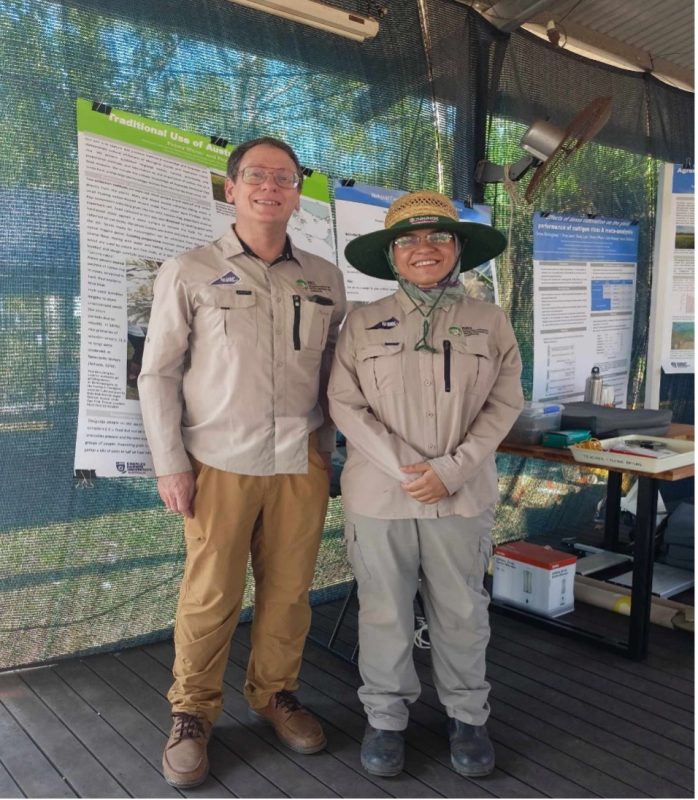
Sean Bellairs (left; Project Lead) and Gehan Abdelghany (right; PhD researcher) represented the Commercialisation of Native Rice project at Daminmin Cultural Festival, Lambells Lagoon, NT, Australia on 30th June 2023 (Source: Gehan Abdelghany).
Lead image: Gehan Abdelghany transplanting wild rice seedlings at CDU research shade house. Credit: Charles Darwin University


